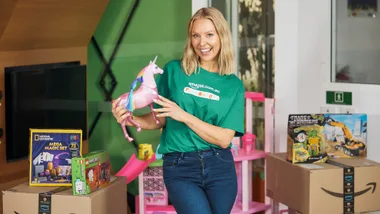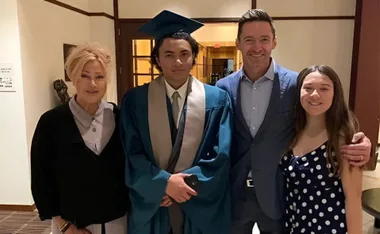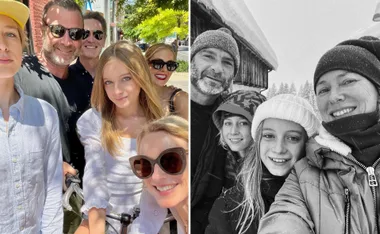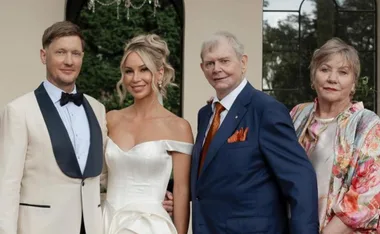Ask Fleur Shaw-Jones how many children she has and she’ll tell you: three. But only one child shares her home. Her first two babies, twins, died minutes after they were born in 2010. Here, she explains the special place they will always have in her life.
Is he your first? It is a benign and well-intentioned question that many parents, including myself, get asked every day of the week. The answer is simple, surely?
“Yes” or “No”. However, the answer I provide can be either “yes” or “no”, depending on who asks the question. Will I ever see them again? If not, I smile politely and say yes. If they are likely to pop up in my life again, then the answer to this simple question is no.
I have an 18-month old son. He is the only child running around our house. He is vibrant, affectionate, funny and adored by all who know him. But he is not our first child or even our second child, he is our third.
He has a brother and a sister who were born 14 months before him. He will never meet them in person, but he has visited their resting place which is marked by a bronze plaque that says all that we feel about them and the gaping loss their premature death left — perfect, longed for, never to be forgotten.
Our first and second child were twins; born 14 minutes apart on 11 December 2010. They lived for just a few short minutes, yet every second of that day is etched in my memory like it happened this morning.
As their plaque suggests, our babies were perfect. But sadly I was not. After an easy 20 weeks of pregnancy, during which I felt vibrant, energetic and crazy with excitement, the wheels fell off — on ultrasound our babies were small for their gestational age.
At 22 weeks gestation, the reason for this declared itself. At a routine obstetrician’s appointment, my blood pressure was sky high. The diagnosis — severe pre-eclampsia.
I was stunned. I had trotted out of my office in high heels to attend the appointment and then planned to head straight home. My husband and I were going out for dinner.
But my commute ended right then and there. Within an hour of leaving work I was occupying a hospital bed. I would return home 24 days later; my life changed forever.
I was informed that I must remain in hospital until our babies were born, the timing of which was completely unknown. What was known, however, was that the chance of carrying the pregnancy anywhere close to term was extremely remote.
The expected date of delivery had moved from 38 weeks to, if we were lucky, 26 weeks.
At 22 weeks I was stuck in a “gestational no man’s land” — our babies were perfectly formed little people, but their organs were not developed enough for them to survive if born that early.
Accordingly, my only job was to eke out as many weeks as possible from my failing body, which was under siege from the effects of pre-eclampsia.
Having been an intensive care nurse, I had cared for women suffering the aftermath of severe pre-eclampsia and its deadly variant, HELLP syndrome (Haemolysis, Elevated Liver Enzymes, Low Platelets).
Accordingly, I knew my situation was dire and the prospect of a successful outcome for all of us was very low. Faced with this knowledge, my only means of survival and hope was to exist in a state of complete denial as to what might transpire.
The magical 26-week mark was Christmas Day and I was determined to make it. The alternative did not bear contemplation.
As news of my condition spread, my hospital room became more festive by the day, with people coming and going, dropping off food and books to get me through the long haul to term. Little did they know, and I was unwilling to admit to them how precarious my situation, and that of our babies, was.
Despite bed rest and a cocktail of drugs my blood pressure climbed day on day until, two weeks after my admission to hospital, I was transferred by ambulance to the Royal Women’s Hospital.
Apparently, I was extremely unwell and if our babies weren’t delivered I would die.
On admission to the RWH I was diagnosed with HELLP syndrome. My body was shutting down. My husband and I were advised that labour would be induced to save my life. I had 24 to 36 hours left at most.
Now there could be no more time on the “inside” for our twins, who were 24 weeks and 1 day gestation and weighed less than 500 grams. We were told that their early gestation and low weight meant their chance of survival was very low, even with maximum medical intervention.
If they were to survive a long period of mechanical ventilation, they would most likely be blind and severely physically and mentally handicapped. Based on the information and advice available to us on that day, we made the heart wrenching decision that we would not resuscitate them when they were born. It is the hardest decision I have ever had to make and it will haunt me forever.
On 11 December 2010, 42 hours after being transferred to the RWH and after a 12-hour labour, our twins were born. At 11.45pm, a girl weighing 386 grams, and at 11.59pm, a boy weighing 452 grams.
The silence in the delivery suite was unbearable. There were no crying babies and no exuberant husband declaring their genders and proudly cutting their cords. Just complete and utter silence. Everyone was speaking in hushed tones and for a short while I didn’t even know where our babies were. I was too sick to ask. Soon though, my husband came over to me with them in his arms.
We unwrapped them from their bunny rugs and inspected them all over, marvelling at their fine little legs and arms, their eyelashes, eyebrows, fingernails and their little pursed lips. They were tiny but absolutely perfect.
“They look like little tiny dolls” was all I could say. I couldn’t even cry. I was so unwell, so overwrought and so exhausted from trying to buy time for them that I felt completely defeated.
Just a few weeks before I thought I was the cleverest person alive — 40 years old, pregnant, twins. Could there be a more perfect scenario?
Now a feeling of utter emptiness and dread overwhelmed me. My wonderful pregnancy had ended, our perfect twins were gone and life as I knew it had changed forever. The next morning the medical staff congratulated me on having survived. I looked at them blankly and said I wished I was dead.
I stayed in hospital for a further 10 days after the birth but would happily have stayed there forever. However, with Christmas looming there was a strong impetus to get me home; lift my spirits.
I left hospital on 22 December and cried all the way home. How could I return to my “old” life after all that had happened? The festivities of Christmas were everywhere and I quickly realised that the Christmas train stops for no one, not even the death of two little babies.
It was the hardest thing to endure. There was nothing worth celebrating, nowhere I wanted to go and no one I wanted to see. I wanted to close the door and wake up when it was all over.
Yet my old self kept prodding me to pep up, go out, see people. It was in my nature to be happy and social, and some people seemed to still expect this of me. So I dragged myself out to dinner, to Christmas Day lunch, the Boxing Day test match and to a New Years’ Eve function.
Yet all the while I was panic stricken and agoraphobic. In hindsight, I was desperate to find a way to feel better. It was a naive approach, but I would have done anything to escape for just a few moments, the feeling of dread that inhabited me constantly. In time I learned there is no way to expedite or conquer grief so I simply surrendered to it and let it have its way with me.
Coupled with my initial need to find a way to feel better, I felt an obligation to relieve the burden of “awkwardness” experienced by family and friends in respect of our “situation”.
This self-imposed pressure stemmed from the broad range of reactions we experienced to the death of our babies. Some people showed incredible insight into our loss, while others completely avoided the topic.
It was like our babies had never existed and I felt that for these people I had to play along. This was by far the most upsetting element of the whole experience and only deepened my sense of isolation and despair. I did not want to be cajoled or cheered up. All I wanted was validation of our heartache.
Soon I came to realise that I needed to do whatever I could to protect myself emotionally. So I closed ranks and went only where I wanted to go and saw only those people I wanted to see. To this day I am regretful that I did not have the strength of character to do this earlier in the process.
Our babies were buried one month after they were born. They lie in a hillside cemetery in the grave of their great-grandparents. It was so final, laying them to rest.
Slowly we began to rebuild our lives and I returned to work three months after I had left the office that fateful day. It was upsetting to be returning to work at the very time when I should have been commencing maternity leave, but it was good to have a purposeful existence once again.
Though content at work, my thoughts were always focused on having another baby. At 41, time was very much against me. Despite medical advice to wait a year before conceiving again, I was pregnant five months after our twins were born.
I have never felt a greater sense of relief and achievement. I had run 10 marathons and completed a law degree at the age of 38, but the determination required for those activities seemed trite in comparison to the mental effort I had to conjure up to conceive again. I was continually plagued with the fear that I would not get another chance.
Incredibly, it was twins again. The chance of recurrent pre-eclampsia was very high and we were advised that “foetal reduction”, where one of the twins would be aborted, offered the best chance delivering a healthy baby.
My position was absolute — I was not willing to undergo a foetal reduction. I would take my chances, confident that I would get further this time around. It seemed to be my destiny. Ultimately there was no decision to be made, as at 12 weeks we were told there would only be 1 baby. Sadly, our other twin had died.
Despite all that had happened, I was determined to enjoy my pregnancy. With daily blood thinning injections and heavy monitoring, we made it all the way to 38 weeks before pre-eclampsia reared its head again.
This time however there was no need to buy time. Our son was delivered the next day. This time around there were lots of noise, a crying baby and a proud father cutting his cord.
As I finish, things are clearer now. There really is only one answer to the question I know I will be asked a thousand times before I die. Is he your first? No matter who asks the question, the answer will always be — no, he’s our third.


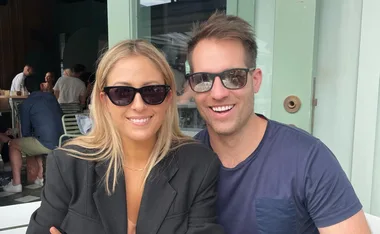


.png?resize=380%2C285)
